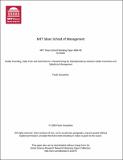| dc.contributor.author | Goncalves, Paulo | |
| dc.date.accessioned | 2011-08-26T17:50:31Z | |
| dc.date.available | 2011-08-26T17:50:31Z | |
| dc.date.issued | 2008-04-01 | |
| dc.identifier.uri | http://hdl.handle.net/1721.1/65413 | |
| dc.description.abstract | Hybrid seed suppliers experience excessive and costly rates of seed returns from dealers, who order in
advance of grower demand realization and may return unsold seeds at the end of the season. Sales
representatives know they must carefully gather information on grower demand for seed types and
quantities to improve their demand forecast and better position their seeds. However, when pressured to
meet sales targets late in the sales cycle, salespeople abandon time-consuming seed positioning to push
out dealers’ inflated orders. Such push effort leads to excessive returns, generating more inflated orders
by dealers the following period and increasing the total sales that agents must achieve to meet their quota,
requiring them to push still more seed. Here we develop a formal dynamic model of the interaction of
sales effort allocation and dealer hoarding behavior to understand the dynamics of corn seed returns
through a model-based field study. Depending on the availability of sales resources, this biased sales
effort allocation can generate a self-perpetuating stream of returns. While incentives to dealers solve the
dealer hoarding problem, they do not address pressured salespeople’s inadequate effort allocation to
pushing seeds. Because decreased sales resources and overly-aggressive sales targets increase the
pressure faced by salespeople, they also lead to higher seed returns. By understanding the causes of seed
returns, our research informs us about the limitations of dealer incentives, shedding light on the important
roles of adequate sales resources management and of setting moderate sales targets. | en_US |
| dc.language.iso | en_US | en_US |
| dc.publisher | Cambridge, MA; Alfred P. Sloan School of Management, Massachusetts Institute of Technology | en_US |
| dc.relation.ispartofseries | MIT Sloan School of Management Working Paper;4694-08 | |
| dc.subject | Salesforce management | en_US |
| dc.subject | sales resource allocation | en_US |
| dc.subject | dealer hoarding | en_US |
| dc.subject | dealer incentives | en_US |
| dc.subject | sales targets | en_US |
| dc.subject | behavioral modeling | en_US |
| dc.subject | system dynamics | en_US |
| dc.title | Dealer Hoarding, Sales Push and Seed Returns: Characterizing the Interdependency between Dealer Incentives and Salesforce Management | en_US |
| dc.type | Working Paper | en_US |
